AI has evolved fast in recent years. Decades ago, computers smarter than the most brilliant humans seemed like a distant dream. But here we are. Artificial intelligence is everywhere—from healthcare and finance to education, entertainment, and beyond.
The Rise of AI in Music Entertainment
AI can revolutionize the way we live, work, and interact with each other. The event industry is no exception to the AI boom. Technology will change and redefine the art of mixing music. For DJs and anyone in the event industry, the concern about artificial intelligence ‘taking’ human jobs is real. More people are questioning the future of their profession. Wedding or mobile DJs, in particular, want to know how AI will impact their careers.
AI isn’t another fleeting trend. It’s here to stay. We live in an era when technology blurs the lines between human originality and intuition. Can AI mimic the unique creativity and artistry of human DJs? Game-changing technology is revolutionizing the industry. Will human DJs still be relevant? Can DJs use tech advancements to enhance performances and streamline the music production process? Job loss and the dehumanization of the profession are concerning. Some will argue that AI lacks finesse, social skills, and intuition or makes the industry more impersonal and less engaging. Others will opt for an AI alternative to a human DJ because they’re cheaper. After all, AI doesn’t require a lunch break or tip.
AI isn’t another fleeting trend. It’s here to stay.
What is Artificial Intelligence?
AI is the science of making machines ‘think’ like humans. AI-backed computer systems can perform tasks that traditionally require human-level intelligence, like problem-solving, decision-making, and information processing. In some cases, AI can do things better than humans, like large-scale data analysis, pattern recognition, and repetitive tasks.
You may not realize it, but AI is already part of your daily routine. Do you use virtual assistants like Siri and Alexa? Do you get personalized show recommendations on streaming platforms like Netflix or Hulu? Playlist suggestions? Spotify uses AI-backed algorithms to connect users with recommended songs, artists, and genres based on usage and preferences.
Pocket DJs and movie recommendations aren’t the only things AI is changing. Artificial intelligence is transforming the wedding DJ scene, and new technology could impact the traditional role of mobile DJs.
What is a Mobile DJ?
Mobile DJs travel to an event or party to play music (like most wedding DJs), while club or radio DJs perform in a fixed location. Mobile DJs, especially wedding DJs, work much more closely with clients. They also have different responsibilities, like:
- Setting up audio equipment
- Playing music according to the client’s preferences
- Blending music for dancing
- MCing the event
- Facilitating the wedding reception (unless a hired wedding planner is there)
Wedding DJs are the heart and soul of the reception. Music sets the tone for the entire event.
Hiring a wedding DJ has been the ‘norm’ for couples since the 1980s. From the late ’80s to the early ’90s, sound systems and recorded music became more accessible and affordable, increasing the demand for DJs over pricey live music. Live wedding music became (and still is) a more high-end commodity. Will live wedding DJs follow suit? Will hiring a “real” DJ a decade from now be a status symbol? Only time will tell.
You may not realize it, but AI is already part of your daily routine.
Human DJs Versus AI – Who Does it Better?
Fully automated DJs have a foothold in the industry. Why? Because they’re cheaper. There are things a DJ does that AI can do just as well or better. That said, computers outperforming humans isn’t anything new. Computers have always been better at completing complex calculations, storing data, and analyzing information.
As new technology continually trickles into the entertainment industry, here’s a breakdown of things AI can do just as well or better than human DJs.
Beat Mix & Match:
In the future, artificial intelligence will mix and transition songs as good as DJs. A few AI algorithms can already match beats and mix tracks to create a smoother transition between songs. However, there are a lot of mixed reviews about AI mixing apps on the market. Some DJs claim the apps available now are less versatile than a DJ and lack the creativity that comes with the human touch. Expect to see AI-powered mixing tools become more sophisticated. Maybe one day, they’ll produce results indistinguishable from a human DJ.
We’re seeing a ‘rage against the machine’ type of resistance to it.
Music Recommendations:
AI is killing the game when it comes to personal music recommendations. Algorithms analyze user data to create personalized playlists based on your listening habits. Last year, Spotify introduced an AI DJ, promising customized recommendations based on your music taste. Spotify’s AI model also suggests podcasts, playlists, and other content to users.
What if the music selection went further than personalized recommendations? Ten years ago, the idea of an AI-backed DJ who could tell what songs get the best reaction on the dancefloor, detect human emotions, or evaluate crowd reactions in real time would have seemed as unlikely as suggesting that flying cars were just around the corner in 1960. Technology is emerging that could help DJs flawlessly analyze the crowd and adapt their music according to the audience’s energy and mood changes. Technology is moving fast. It’s likely a matter of time until AI is tuned into people’s music preferences at an event through phone apps or video monitoring software that will determine what gets a positive reaction from a crowd.
Technology is emerging that could help DJs flawlessly analyze the crowd and adapt their music according to the audience’s energy and mood changes.
Sound Optimization:
We’re reaching a point where AI can adjust equalization, volume, and other sound settings to complement the venue’s acoustics. DJs can output optimal sound quality without constant manual adjustments.
Taking it further, AI DJs (non-human) will likely be able to adapt to various event types, like raves or weddings. Advanced AI DJs can fine-tune the sound system according to the event space and use algorithms and real-time feedback to optimize the audio output.
Playlist Curation:
Platforms like Spotify, Apple Music, and Pandora use AI and machine learning algorithms to suggest songs and curate playlists. While we’re not there yet, AI-driven software will soon likely be able to analyze a couple’s music preferences, guest demographics, and even social media profiles to create personalized playlists.
These systems can sift through millions of songs to find the perfect match for the wedding’s theme and the couple’s taste, which would be time-consuming and potentially overwhelming for human DJs.
How Are Human DJs Not Replaceable?
As technology gets better and better, being in an industry heavily impacted by AI can be intimidating. Remember, a human wedding DJ brings things to the table that will be difficult to replace.
Here’s a breakdown of things AI can’t do as well as humans.
Audio Equipment Setup:
A huge part of being a mobile DJ is traveling to a location to set up audio equipment. It may be a while before AI can do this, but you never know. AI could make determining audio equipment easier. Technical issues and equipment failures can also come with the territory. A human DJ can quickly adapt and improve solutions without ruining the flow of the event, while a tech failure could destroy an event hosted by an AI DJ.
Human Touch:
An AI DJ can’t tell stories or crack a joke. A DJ’s job goes far beyond playing music. DJing is an art form that involves creativity, skill, and improvisation. One area where AI might have trouble taking over for the mobile DJ is the personal touch of a human MCing an event. Humans bring an emotional depth and personal touch to an event that AI can’t replicate. While one day, an AI DJ may be able to respond to the energy in the room, we’re not there yet. There’s also something to be said about having human interaction and connection when it comes to events. Humans naturally convey passion, enthusiasm, and energy, which can be infectious and vital for maintaining a lively event atmosphere.
Customized Announcements:
Human DJs can interact with guests in a way that an AI cannot. An MC can make real-time, customized announcements relevant to the event or the audience, like a shoutout, song dedication, or important updates. Even though MCing is becoming slightly less common, many couples still prefer having someone there who can maintain the flow, even if they’re not announcing every bridal party entrance or cake-cutting photo op.
There is still a certain magic that only a human can bring to a special occasion. An AI DJ can’t convey a sentimental attachment. For example, when a DJ plays a song and mentions it was the bride’s field hockey team’s energy song from college or explains why the bride chose a certain song for her father-daughter dance, it evokes emotions.
Handling Feedback:
Being a DJ is an inherently people-focused profession. Part of the DJ’s job is to engage with the audience, take requests, and interact with people. Sure, a DJ can program an AI algorithm to accept human requests, but AI can’t understand complex, vague, or nuanced requests. Requests or feedback go far beyond song selection. If we lose human-to-human interaction during events, will it feel less special?
Visuals:
We haven’t exclusively needed a human to play music since the invention of the phonograph in 1877. Just because we don’t need live performers to enjoy music doesn’t mean they are any less sought-after. Even though a DJ isn’t physically singing or playing an instrument, a computer can’t replace their energy, passion, and personal expression. People have expectations of how a DJ should look and behave while playing. Visuals are a huge part of the gig. Being behind the turntables is like being on stage as a performer. Will the audience miss this traditional image we all have of the DJ at an event? It’s very possible.
There is still a certain magic that only a human can bring to a special occasion.
The AI Resistance Movement
Many people embrace AI, as it’s inevitably advancing and changing our world. However, AI is not for everyone. We’re seeing a ‘rage against the machine’ type of resistance to it. There are growing concerns about AI’s potential negative impacts on society and control of human activities.
When will AI integration into our everyday lives become too much? For some, a wedding is far too personal to leave in the hands of a ‘robot.’ AI resistance may help prevent AI from completely taking over the DJ industry.
Finding a Balance Between AI and Human Interaction
Artists, musicians, writers, and DJs have to choose to stand their ground, compete with AI, or use AI to their advantage. Many successful DJs are learning how to use AI to enhance their productions.
You don’t have to fight AI. Consider using AI to make your job as a wedding DJ easier. AI can help organize playlists, mix tracks, and suggest new music based on the couple’s taste. Leaving some of the more technical stuff to AI means you can focus more on the human side of the event. Weddings are deeply personal events where your human intuition and creativity can shine.
You don’t have to fight AI. Consider using AI to make your job as a wedding DJ easier.
What’s Next?
Is there a way to make yourself future-proof as a DJ? As MCing takes a back seat, the most important thing is to hone in on being an exceptional DJ. Talented human DJs will very likely become a high-end commodity in the next decade. Building a personal brand through social media, growing an audience, and becoming a well-known name will lead to more in-person bookings.
Conclusion
We know the event industry is changing. Just like modern couples may toy around with the idea of a live band versus a DJ, we’ll be adding AI DJs into the mix before we know it. AI can compete or outperform humans in some areas, but AI is unlikely to fully replace human DJs.
AI will never replicate a human’s innate originality and instinct. The future of the DJ industry is likely to be a hybrid of technology and human creativity, offering the best of both worlds to entertainers and clients.
Article by Sarah Makhluf with input from Ivan Moore. If you are looking for a human wedding DJ in the Cleveland area, contact Synapse Entertainment to see if we are available for your date.
To learn more about AI’s effects on DJing, see Nick Spinelli’s video here. Also, see these articles from DJ City and Toolify.
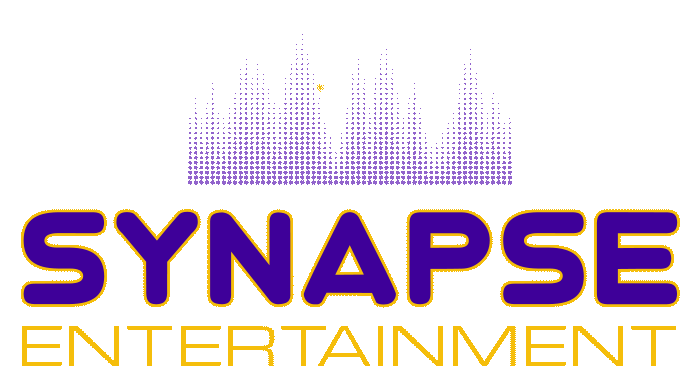
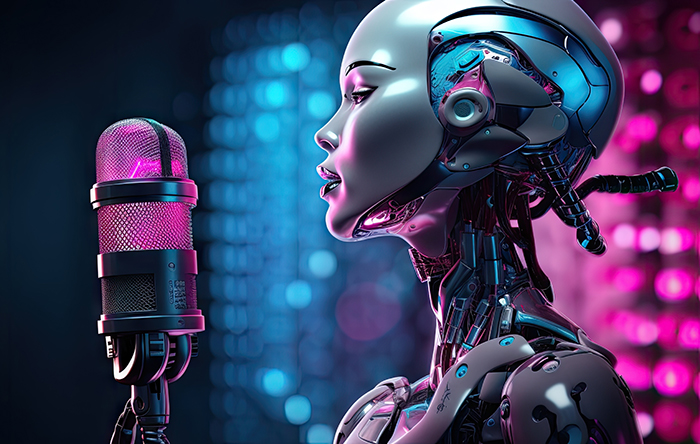

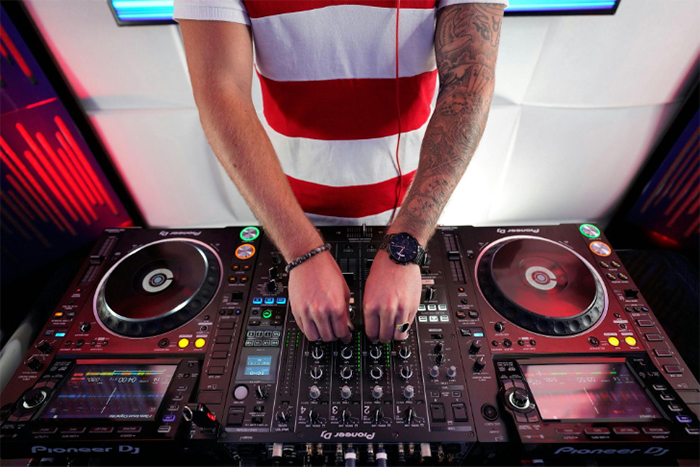


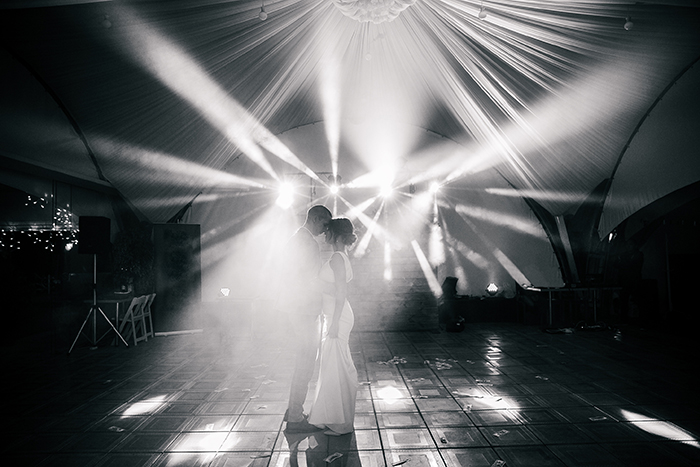
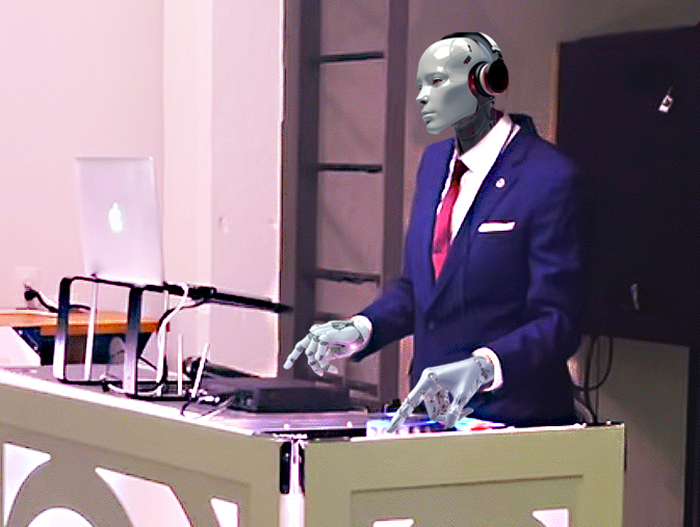
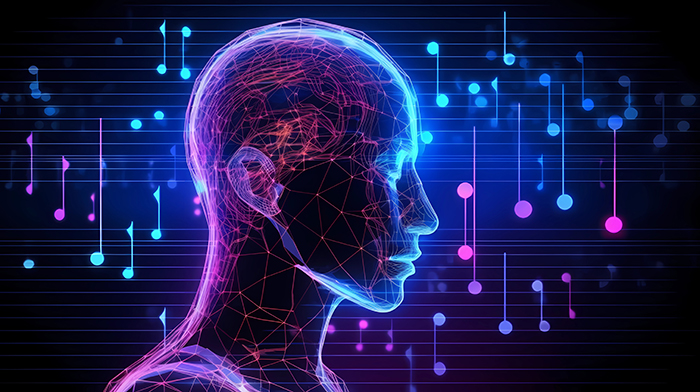
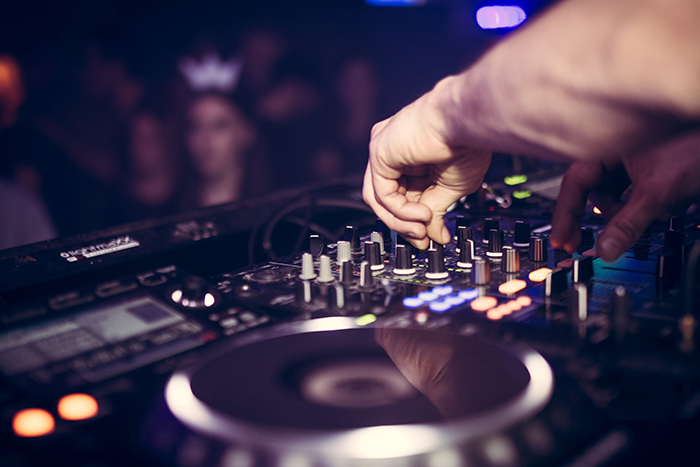
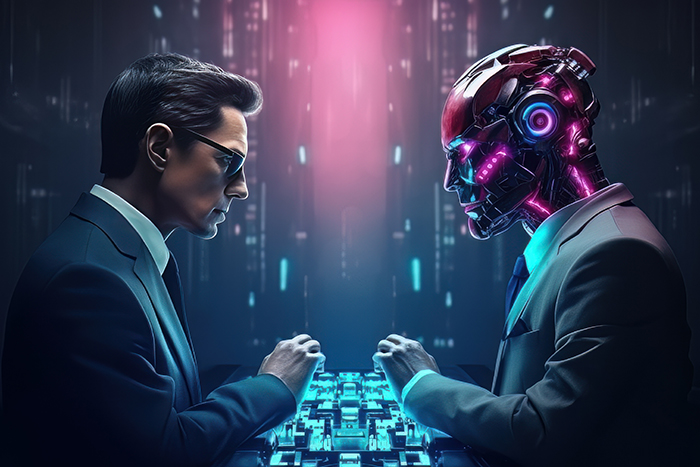
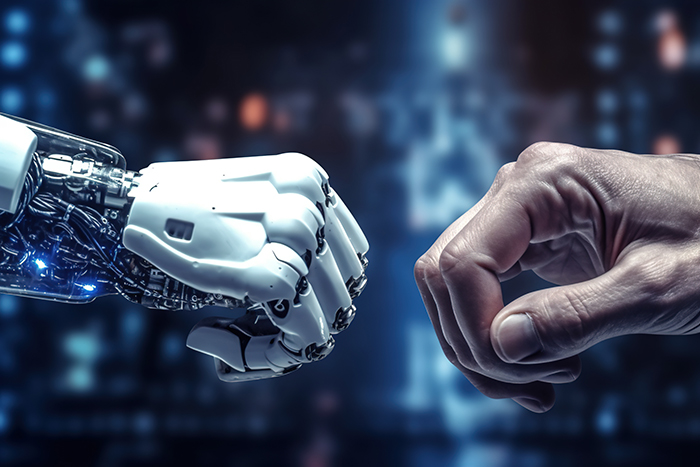
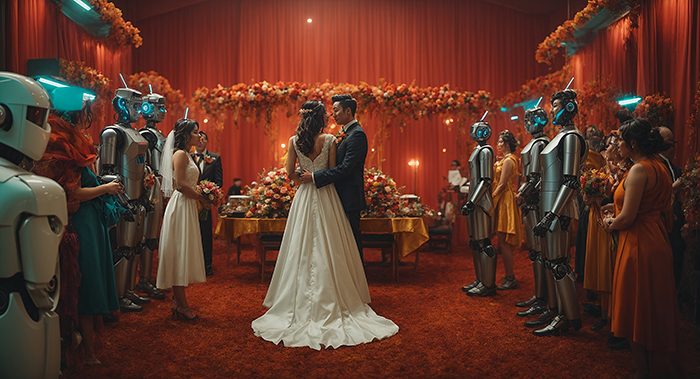


Leave a Reply
Want to join the discussion?Feel free to contribute!